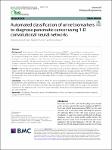Search
Author
- Anders, Risan (1)
- Marwa, Radad (1)
- Mohamed Esmail, Karar (1)
- Mohamed Kais, Msakni (1)
- next >
Subject
- 1D-CNNs (1)
- random forest. (1)
Date issued
- 2023 (2)
Has File(s)
- true (2)
Search Results
Early diagnosis of Pancreatic Ductal Adenocarcinoma (PDAC) is the main key to surviving cancer patients. Urine proteomic biomarkers which are creatinine, LYVE1, REG1B, and TFF1 present a promising non-invasive and inexpensive diagnostic method of the PDAC. Recent utilization of both microfluidics technology and artificial intelligence techniques enables accurate detection and analysis of these biomarkers. This paper proposes a new deep-learning model to identify urine biomarkers for the automated diagnosis of pancreatic cancers. The proposed model is composed of one-dimensional convolutional neural networks (1D-CNNs) and long short-term memory (LSTM). It can categorize patients into healthy pancreas, benign hepatobiliary disease, and PDAC cases automatically. |
This paper studies a prediction problem using time series data and machine learning algorithms. The case study is related to the quality control of bumper beams in the automotive industry. These parts are milled during the production process, and the locations of the milled holes are subject to strict tolerance limits. Machine learning models are used to predict the location of milled holes in the next beam. By doing so, tolerance violations are detected at an early stage, and the production flow can be improved. A standard neural network, a long short term memory network (LSTM), and random forest algorithms are implemented and trained with historical data, including a time series of previous product measurements. Experiments indicate that all models have similar predictive capabili... |


